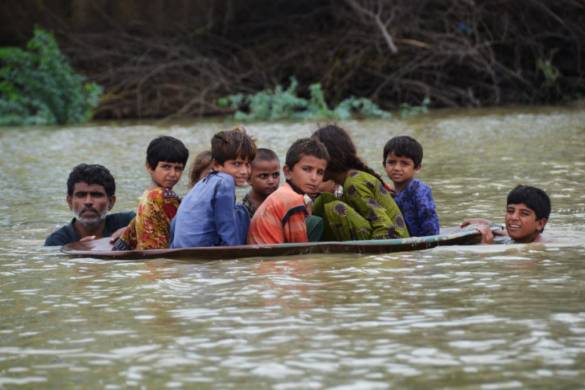
In Pakistan, children are at risk of various forms and types of abuse, including child labour, corporal punishment, sexual abuse and harmful traditions including child marriage. While child marriage affects both boys and girls, the latter are significantly more likely to be impacted.
The Demographic Health Survey 2017-2018 found that 29 percent of women were married before turning 18 against 5 percent of men. Over 12.5 million children or nearly 16 percent of the pertinent demographic are involved in child labour with 13 percent to 14 percent of these being between five and 15-years-old. Although incidence of child marriage has decreased significantly over the last three decades, the practice remains a pressing problem. Violent discipline too continues to be widespread. According to the 2017-2018 MICS Survey on Violent Discipline in Punjab, 81 percent of children aged up to 14 have experienced some form of physical violence and 74 percent have experienced some form of psychological violence in the past months. Birth registration constitutes a major social challenge as the country lacks a comprehensive and efficient system. With birth registration not undertaken systematically, the basic right to legal recognition stands at risk.
National Commission on the Rights of Child (NCRC) chairperson Afshan Tehseen, in her statement on the World Day for the Prevention of Child Abuse, said abuse was a grave violation of children's rights and one of the greatest threats to children's life, survival, development and participation rights. Tehseen said ensuring children's rights was particularly important because Pakistan had a unique window of opportunity where the young could truly determine the nation's destiny. The time to act is now - by strengthening child rights protection mechanisms and legislation, as well as through extensive public awareness campaigns. The Commission, she said, has established a complaint mechanism that had effectively addressed child abuse. Tehseen said the NCRC had analysed various child rights violations and issued policy briefs on street children, child marriages, forced conversion, child domestic labour, juvenile justice to identify gaps and recommend remedial measures.
While the government has taken a number of initiatives to secure the rights of children, further action is imperative given the scope of the challenge. Law enactment and implementation mechanisms vary from province to province and overall enforcement remains a challenge. There is a need to establish dedicated ministries for children at the federal and provincial levels. In addition, advisers should be appointed across federal and provincial cabinets to advocate concerns.
The world also celebrates Universal Children's Day on 20 November. Children are the most valuable resource of any society: the future engine of prosperity, harmony and creativity. On the occasion of Universal Children's Day, the NCRC chairperson shared that the Commission was striving to strengthen laws governing children's rights, and will continue its work with the federal and provincial governments on implementation. Tehseen called on all government agencies and civil society organisations to work together to ensure a Pakistan secure for children that allowed them to realise full potential.
The Demographic Health Survey 2017-2018 found that 29 percent of women were married before turning 18 against 5 percent of men. Over 12.5 million children or nearly 16 percent of the pertinent demographic are involved in child labour with 13 percent to 14 percent of these being between five and 15-years-old. Although incidence of child marriage has decreased significantly over the last three decades, the practice remains a pressing problem. Violent discipline too continues to be widespread. According to the 2017-2018 MICS Survey on Violent Discipline in Punjab, 81 percent of children aged up to 14 have experienced some form of physical violence and 74 percent have experienced some form of psychological violence in the past months. Birth registration constitutes a major social challenge as the country lacks a comprehensive and efficient system. With birth registration not undertaken systematically, the basic right to legal recognition stands at risk.
National Commission on the Rights of Child (NCRC) chairperson Afshan Tehseen, in her statement on the World Day for the Prevention of Child Abuse, said abuse was a grave violation of children's rights and one of the greatest threats to children's life, survival, development and participation rights. Tehseen said ensuring children's rights was particularly important because Pakistan had a unique window of opportunity where the young could truly determine the nation's destiny. The time to act is now - by strengthening child rights protection mechanisms and legislation, as well as through extensive public awareness campaigns. The Commission, she said, has established a complaint mechanism that had effectively addressed child abuse. Tehseen said the NCRC had analysed various child rights violations and issued policy briefs on street children, child marriages, forced conversion, child domestic labour, juvenile justice to identify gaps and recommend remedial measures.
While the government has taken a number of initiatives to secure the rights of children, further action is imperative given the scope of the challenge. Law enactment and implementation mechanisms vary from province to province and overall enforcement remains a challenge. There is a need to establish dedicated ministries for children at the federal and provincial levels. In addition, advisers should be appointed across federal and provincial cabinets to advocate concerns.
The world also celebrates Universal Children's Day on 20 November. Children are the most valuable resource of any society: the future engine of prosperity, harmony and creativity. On the occasion of Universal Children's Day, the NCRC chairperson shared that the Commission was striving to strengthen laws governing children's rights, and will continue its work with the federal and provincial governments on implementation. Tehseen called on all government agencies and civil society organisations to work together to ensure a Pakistan secure for children that allowed them to realise full potential.

